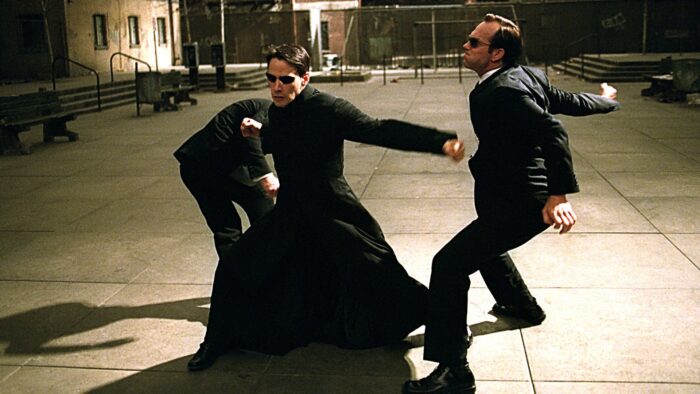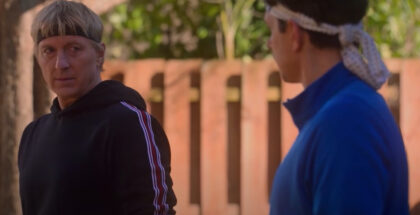What Is The Matrix Reloaded? Revisiting the bamboozled sequel
Review Overview
Action
7Sci-fi
5Philosophy
6Mark Harrison | On 19, Dec 2021
Director: Lilly Wachowski, Lana Wachowski
Cast: Keanu Reeves, Carrie-Anne Moss, Laurence Fishburne, Hugo Weaving, Jada Pinkett Smith
Certificate: 15
Warning: This contains spoilers.
“It was a triumph equalled only by its monumental failure,” explains The Architect (played by Helmut Bakaitis) in the finale of The Matrix Reloaded. He’s talking about the first iteration of the titular simulation, a perfect fantasy world that its human occupants rejected, but (fairly or unfairly) he could also be talking about the second and third Matrix films, in which Lilly and Lana Wachowski turn sci-fi war movie tropes on their head.
About six months after the events of Part One, this film starts with location of humanity’s real-world home of Zion being discovered by the machines. With 72 hours until the squid-like robotic Sentinels drill their way to the city and annihilate the resistance, the human crews band together to help the newly superpowered Neo (Keanu Reeves) realise his destiny as The One.
However, Neo is haunted by foreboding visions of Trinity (Carrie-Anne Moss) dying inside the Matrix and, as he embarks on a mission to locate the all-important Keymaker (Randall Duk Kim), all his assumptions about the system are challenged. What’s more, ex-agent Smith (Hugo Weaving) has re-emerged with the new ability to overwrite others with himself – apparently, the opposite of The One is many – and is gradually taking over everybody.
Shot back-to-back with The Matrix Revolutions, Reloaded is very much the first part of a two-part story. Heck, it’s pretty much act one, expanded to feature-length by some of the series’ most ambitious action sequences, which still mostly function to keep the audience engaged in between dialogue about choice and destiny. Where the first film baked its themes into its action, this one doesn’t mix them quite as well.
Ironic though it is in a film where the characters are pressed to work together in synchronicity (“If one fails, all fail”) so that they can defeat a similarly methodical adversary, there are lots of spare parts. Revealing the Oracle (Gloria Foster) is a program and introducing similar artificial characters – such as the Keymaster, the Architect, and the Merovingian (Lambert Wilson) – all serve to tee up the endgame, but it leaves Reloaded as something of a difficult middle instalment.
It’s also a film with lots of fights that no one wins, whether it’s Trinity’s mid-air shootout with an agent or Neo retreating from all the Smiths to avoid fighting endlessly. Even the film’s glorious 20-minute freeway chase action sequence is a holding pattern for the thematic whammy, which has the same told-not-shown aspect as the rest of the film.
In the case of the whammy, it’s especially exasperating, as it buries a potentially shattering twist in a thesaurus-ful of utterly atrocious dialogue. “Ergo”, “vis a vis”, “systemic anomaly”… cut through the chuffa and you have a film that’s not afraid to trample on Laurence Fishburne’s Morpheus, and the expectations of genre cinema in general, by suggesting that The One is simply a design error onto which humans have projected a saviour narrative. It tells us at length how everything we know is wrong but ultimately fails to show it.
At the film’s finale, Neo is told to go back to the Machine Source by both sides for different reasons, whether to fulfil his messianic destiny and win the war against the machines, or to play his part in maintaining the existing system, but he refuses and goes down a third route. It’s staggeringly ahead of its time to have an action movie hero opt out of a system of violence rather than perpetuate it, to say nothing of how often this exact quandary happens for heroes and their mentors and enemies in the tried-and-tested structure of modern Marvel movies.
You can see how this irked fans the same way as something like Star Wars: The Last Jedi did years later, although this isn’t nearly as deft at contradicting expectations. Reeves and company all go along with new developments nicely but, as in the third film, there’s hardly anything in the way of standout lines or moments like the ones that made the original such a firm favourite. There’s also an increased reliance on computer-generated effects that were ground-breaking at the time but have aged poorly at some points. For the most part, though, the action remains as flabbergasting as ever.
The big spoiler for The Matrix Reloaded is in the title – all of this has happened before and will happen again, right up to the point where Neo diverges at the end. With the context of the following film, which is a rare war-on-terror-era blockbuster that posits the futility of violence in resolving conflicts, the second film is deliberately something of a holding pattern, where cycles (or Revolutions?) of war repeat until the cliffhanger ending brings an abrupt but temporary halt.


















